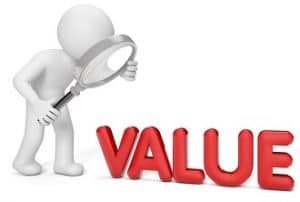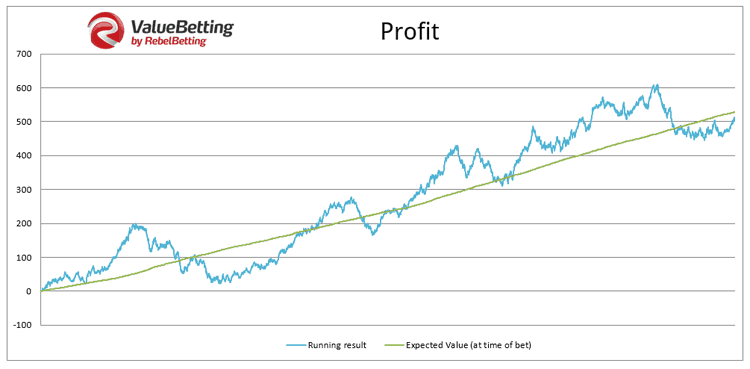Here you'll find football corners betting tips from our expert football analyst, Liam Johnson. All of the corner predictions published here on WhichBookie are 100% free.
 Unless you have a crystal ball, value betting is actually the only way to guarantee that you make a long term profit from gambling. But some people still don’t understand the concept, or how to use it effectively to beat the bookies.
Unless you have a crystal ball, value betting is actually the only way to guarantee that you make a long term profit from gambling. But some people still don’t understand the concept, or how to use it effectively to beat the bookies.
This is the first in a series of articles that will show you how to beat the bookies in the long term. In this guide we’ll explain what value betting is, why it works and how you can use it. If you’re serious about making a profit from betting, this could be the most important guide you’ll ever read…
Put simply, value betting is betting on outcomes where the odds are greater than the true probability of them winning. It doesn’t matter if you believe the selection will win or not, if the odds on that selection are priced too high, it has value in the long-term.
In order to understand value bets, we should first take a look at how bookmakers offer the odds that they do.
Do bookmakers make money? Yes, of course they do and it’s not down to punters being bad at picking winners. It’s because the bookmakers have the edge on all betting markets. Bookmakers have the edge as the odds which they offer to customers are generally lower than the actual probability of them happening.
Let’s take a look at an example.
 The simplest and most popular example is to consider betting on the toss of a coin. This isn’t so silly as it sounds, you can actually do exactly that in cricket.
The simplest and most popular example is to consider betting on the toss of a coin. This isn’t so silly as it sounds, you can actually do exactly that in cricket.
You probably already know that assuming the coin toss is fair, there’s an equal probability of it landing on heads or tails. In gambling odds, that is represented as Evens, or as 2.0 in decimal odds.
So, there’s an equal chance of the two possible outcomes. Therefore, if you were to bet on either outcome, you should be offered odds of evens right? Not exactly. If a bookmaker was to offer odds on heads or tails, they wouldn’t offer odds of 2.0. Instead, they’d likely offer something like 1.95. That difference between the true odds (2.0) and the odds the bookmaker is offering (1.95) is the bookmakers edge. If an equal number of people were to place equal bets on heads and tails, half the people would win their bet and half would lose. However, the bookmaker would make a profit regardless of the result.
Let’s take a look at another example using a football match.

Most punters would look at the odds offered above and simply select the outcome they believe is most likely to win. However, is there value in the above odds?
In order to determine the probability of any outcome in an event, we can use a formula.
Probability – (1 / odds) x 100
So, let’s take a look at the probability of each of the three outcomes. PSG, Draw and Real Madrid
If the odds were fair, the probability of all outcomes would total 100%. For example, heads and tails on a coin toss each have a 50% chance of occurring which totals 100%. However, if we add up the totals from the football match above, we get:
45.45 + 27.03 + 33.33 = 105.81%
So why do the probabilities total more than 100%?
Well, this is essentially how bookmakers make money and is called the ‘over-round’.
In the example above, the over-round is 5.81%. If equal bets were placed on all three outcomes, the bookmaker would make a profit of 5.81% regardless of the outcome. The bookmaker will have a positive over-round on every market to ensure they make a profit whatever the end result.
So, we’ve established that the bookmaker has the edge by applying an over-round and so in the long-term, it’s not possible to make a profit, correct? Well, not quite. Bookmakers do occassionally price selections incorrectly and in some cases, these can be value bets.
Let’s go back once again to a coin toss. You’d expect odds of 2.0 for each outcome putting aside bookmakers over-round. However, what if a bookmaker was offering odds of 2.1 on heads? Would you take it? You should as there is value in that bet.
That is essentially how value betting works. You look to make a long term profit by only placing a wager when the odds are in your favour.
We established above that if a bookmaker is offering odds above the true probability of it occurring, then it’s a value bet . However, despite it being a good value bet in the long term, there is no guarantee that it’s going to win. With value betting, you have the edge but the success of value betting shouldn’t be determined on one bet or even a hundred bets. Although a bet may lose, it doesn’t mean it was a bad bet. If you are offered odds of 2.1 on a coin toss landing on heads then it’s a good bet even if it lands on tails as if you placed that bet an infinite number of times, you’re going to be in profit as the odds on offer are greater than the true probability of it winning.
When value betting, it’s important to understand variance and that you will have losing periods. Some of which may be lengthy. However, as you have the edge, you will make a profit in the long term.
Take a casino for example. We all know that a casino has the edge on all casino games. For roulette, it’s around 2.5% and for blackjack, around 0.05%. That means for every £100 wagered on roulette, a casino will make £2.50 on average. However, that’s not to say that a casino won’t be down at the end of the day or week. After all, a player could go on a lucky streak and win a lot of money. Ever heard of casinos offering winning players comps such as free hotel rooms, food or drinks? Why would they do this if a player is winning? Well, they know that the longer a player plays at the tables, the more the variance will decrease and the more the house edge will come into effect. If a player plays 10 hands of blackjack, they may win but if they played an infinite number of hands, they will be down by the amount of the house edge on that game.
With value betting, you have the edge and not the casino or bookmaker. Therefore, you will experience periods where you lose but the longer you do it, the more you’ll see a long-term profit.
Because of variance, it’s important to keep a record of your bets when value betting. It’s easy to be disheartened by a losing streak and this that you’re failing. However, a quick look at your long-term profit graph should reassure you that you are actually making a profit and that losing streaks are part of the process.
 Ok, so you hopefully now know what value bets are and that it’s possible to make a profit from them in the long-term. So, how do you find value bets?
Ok, so you hopefully now know what value bets are and that it’s possible to make a profit from them in the long-term. So, how do you find value bets?
In order to find a value bet, you must have an idea of the true odds first. This can be tough but a good place to start are the betting exchanges. Betting exchanges such as Betfair Exchange usually offer odds closer to the true probability of them occurring compared to bookmakers. For example, a betting exchange may offer 11/1 odds on England winning the World Cup whereas a bookmaker may offer odds of just 9/1. If we assume that the odds available at Betfair Exchange are the true odds, then if a bookmaker is offering odds higher than these, they can be considered value bets.
You can use odds matcher software to find these bets as shown in the image below.

The image above shows two bets where the odds at the bookmaker are greater to those on Betfair Exchange. The bookmakers odds are shown in green and exchange odds in blue. Sometimes, these are considered to be ‘arbs’ but in this case they aren’t as the commission charged by Betfair Exchange would result in a loss. However, they can still be considered value bets.
Odds matcher software isn’t designed to find value bets as the exchange odds are actually the lay odds rather than the back odds. Although the lay odds will be greater than the back odds, resulting in more value, there are better options to find value bets. One of those options is to use an actual value betting service.
Rebel Betting is a service which mainly provides customers with arbitrage software. However, they also offer value bets as part of their package. These are bets found at bookmakers which Rebel betting believe are priced too high. There are usually hundreds of value bets available and some of their customers are reporting excellent results as shown in the graph below.

The mathematics behind value betting is sound. If you’re offered odds on something which are greater than the true odds of it happening then it’s a good bet and a value bet. However, there are downsides to value betting.
The main disadvantage of value betting is the variance. It’s possible and very likely that you’ll experience losing periods when value betting and so you need to ensure you have the mental and financial capabilities to get through these periods. For some, it can be easy to tilt or give up too early when going through these periods which could result in an overall loss.
Another concern is whether or not a value bet does actually have value. Yes, we can look at the odds available on Betfair Exchange or use a value betting service such as Rebel Betting but how do we know that they are actually value bets? What actually are the TRUE odds of Liverpool beating Arsenal on Saturday or Blazing Thunder winning the 3pm at Ascot? Maybe there are factors which haven’t been taken into consideration by any parties which affect the true odds.
Value betting isn’t for beginners and it is more of an advanced strategy. If you have a good knowledge of betting and odds then value betting could be a great earner for you.
We hope this article has helped you understand what value betting is and how to find value bets. Take a look at some of our other value betting articles for more information.
